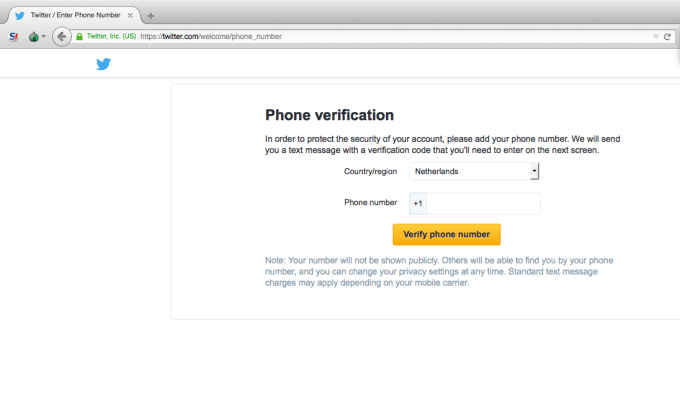Twitter last week announced plans to begin tracking troublesome users via their mobile phone number. Along those lines, it has begun forcing users of anonymous web browser Tor to provide a number in order to open a new account.
Update: A Twitter representative told TechCrunch that the company has not made specific changes to the registration process for Tor browser users.
Twitter does not block or force Tor users to phone verify in order to sign up. Occasionally, signups and logins may be asked to phone verify as they may exhibit behavior similar to spam. This is applicable to all IPs and not just Tor IPs.
However, we repeated the sign-up process more than a dozen time and each time a phone number was required, while many on Twitter also found the same. The exception, it seems, is for browsers like Mozilla which can run Tor. In the latter case, Twitter does not appear to be requiring phone verification. At the least, it seems that more connections via Tor are being flagged as potentially spam accounts and thus require phone verification.
The U.S. company doesn’t mandate its users to associate their account with a mobile number — that’s optional — but its new security system will use short-term suspensions to get the digits of serial trolls. The idea here is to find something identifiable that can be used to trace them if they open new accounts, as many serial abuses do.
Those who open a new account via Tor, however, will have their number added to Twitter’s database right away, following this apparent new change in the sign-up process.
The issue was first flagged on Twitter, and we confirmed it with our own testing.
https://twitter.com/JZdziarski/status/572593479072788480
I was able to open a new Twitter account using Google’s Chrome browser by just providing an email address. The same process done within Tor left me needing to submit a phone number for SMS verification.

We contacted Twitter for comment, but the company had not responded at the time of writing.
It isn’t clear whether Twitter is clamping down on Tor because it sees the browser (and its ability to protect a user’s unique IP address) as fertile grounds for trolls. There’s a chance that it may be testing new process that will eventually roll out to all new sign-ups.
The problem with this move is that, despite its reputation with some, Tor is not simply a front for illicit activity. Its security (relative to other browsers) is relied on by many operating in legitimate circles, including those working as human rights and security activists. Forcing all new accounts to provide directly identifiable data — such as a phone number — is a risk to those that need to keep a low profile.
It isn’t just about the privacy minded though. Tor has been an important point of access for regular internet users in cases where Twitter and other social networks have been blocked. For example, in Turkey last year.
https://twitter.com/GalouGentil/status/451765192658276352
Given that the Turkish government shut down Twitter accounts that it found disagreeable using court orders, the new process for Tor would complicate things for censored users rejoining Twitter if the Turkey situation occurred again now.
